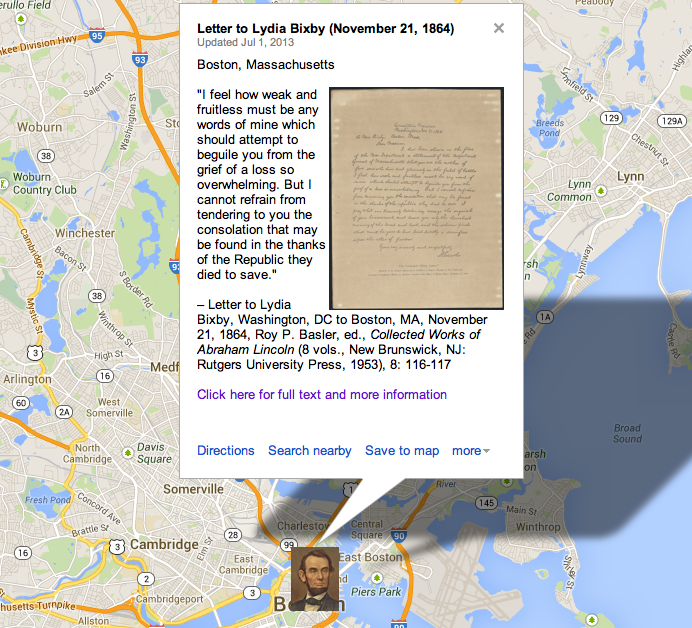Contributing Editors for this page include Michael Mazzullo
Ranking
#71 on the list of 150 Most Teachable Lincoln Documents
Annotated Transcript
On This Date
HD Daily Report, November 21, 1864
The Lincoln Log, November 21, 1864
Custom Map
Close Readings
Michael Mazzullo, “Understanding Lincoln” blog post (via Quora), June 27, 2014
How Historians Interpret
“The beautiful Bixby letter was not written by Lincoln but rather by John Hay, nor was its recipient the mother of five sons killed in the war. She lost two of her boys and tried to cheat the government out of money by claiming that the others had been killed. Of the three survivors, one had deserted to the enemy, another may have done so, and the third was honorably discharged. Mrs. Bixby was born in Virginia, sympathized with the Confederacy, and disliked Lincoln so much that she apparently destroyed the letter in anger. Evidence suggests that she ran a whorehouse in Boston and was ‘perfectly untrustworthy.’ (Though he did not compose the famous communication to Mrs. Bixby, Lincoln on occasion wrote exceptionally moving and beautiful letters of condolence, like those he sent to the parents of Elmer Ellsworth in 1861 and to Fanny McCullough the following year.) The adjutant general of Massachusetts, after hand-delivering the letter to Mrs. Bixby, provided copies to newspapers, which gave it wide distribution.”
–Michael Burlingame, Abraham Lincoln: A Life (2 volumes, originally published by Johns Hopkins University Press, 2008) Unedited Manuscript by Chapter, Lincoln Studies Center, Volume 2, Chapter 35 (PDF), 3856-3857.
“Lincoln’s heart went out to mothers who suffered multiple losses – women such as Sarah Mills of Des Moines, Iowa, who lost her husband, father, and brother at the battle of Corinth, Mississippi, and Polly Ray, a widow in North Carolina whose seven sons were killed in the war. Lincoln had recently written a compassionate and masterful letter to a Massachusetts woman, Lydia Bixby, who claimed to have lost five sons in the war… Years later historians discovered that Lydia Bixby was a Southern sympathizer who ran a whorehouse and that she had lost two, nor five, sons. She did indeed have three other sons: one had deserted the army, another may have deserted, and the third was honorably discharged. Despite the mythology of her case, Lincoln’s Bixby letter is a classic example of presidential compassion from a deeply caring man who would feel the pain of those who had lost loved ones.
–Donald Winkler, Lincoln’s Ladies (Nashville: Cumberland House, 2004), 192.
NOTE TO READERS
This page is under construction and will be developed further by students in the new “Understanding Lincoln” online course sponsored by the House Divided Project at Dickinson College and the Gilder Lehrman Institute of American History. To find out more about the course and to see some of our videotaped class sessions, including virtual field trips to Ford’s Theatre and Gettysburg, please visit our Livestream page at http://new.livestream.com/gilderlehrman/lincoln

